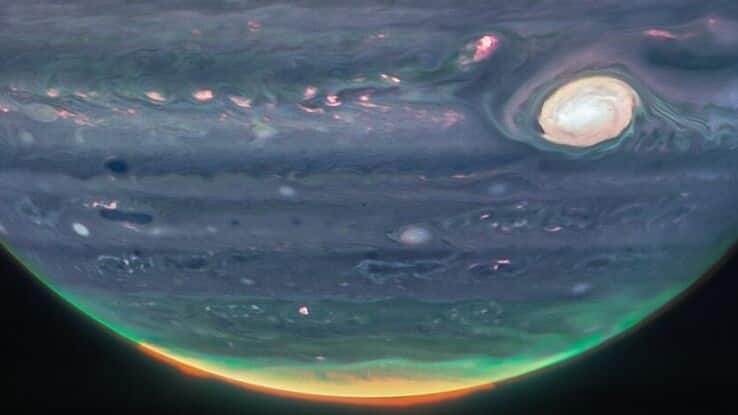Jupiter's unexplained nighttime glow sparks dark matter theory
What's the story
Scientists have long been intrigued by the enigmatic nature of dark matter, a substance believed to constitute approximately 70 to 80% of all mass in the universe.
Its existence is inferred from its gravitational effects on galaxies, despite not interacting with normal matter in detectable ways.
Now, researchers propose that an infrared glow observed in Jupiter's atmosphere could be a crucial indicator of dark matter.
Theoretical proposition
Dark matter's interaction could illuminate Jupiter's atmosphere
Physicists Carlos Blanco and Rebecca Leane suggest that the infrared glow in Jupiter's atmosphere could be because of an interaction with dark matter.
They propose that "dark matter can produce an additional source of H3+ in planetary atmospheres."
This H3+, or trihydrogen cation, is a charged hydrogen ion found abundantly in Jupiter's atmosphere, potentially indicating the presence of dark matter.
Planetary advantage
Jupiter: A prime location for dark matter detection
Jupiter's size and relatively cool core make it the most efficient local captor of dark matter, according to Blanco and Leane.
They theorize that dark matter could scatter, be captured by planets, and then annihilate to produce ionizing radiation.
This process could occur in the ionosphere, a high layer in planetary atmospheres.
When two dark matter particles collide and destroy each other, they generate a burst of heat or light or both.
Detection difficulties
Detecting dark matter: A challenge amidst solar interference
Detecting dark matter's annihilation process is challenging due to other ionizing processes active in the Solar System.
To minimize interference, Blanco and Leane studied measurements from Jupiter's equatorial region at night, specifically three hours on either side of Jovian midnight.
While no excess H3+ was detected, their findings allowed them to establish constraints on how this particular type of dark matter should behave.
Future prospects
Future research: High-Precision measurements for dark matter detection
Blanco and Leane have highlighted the potential of dark matter to produce ionizing radiation in planetary atmospheres, detectable through an excess of atmospheric trihydrogen cations.
They suggest that "dark matter atmospheric ionization may be detected in Jovian exoplanets using future high-precision measurements of planetary spectra."
Their research, published in Physical Review Letters, opens up new avenues for understanding the elusive nature of dark matter.
